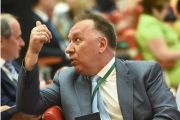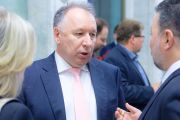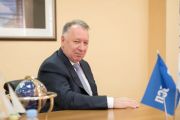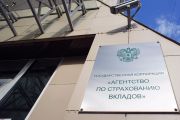The real drama unfolded around the obscure Cyprus firm Hervet Investments: untold wealth, deceit, family ties and deceived trust. The family of Sergei Bazhanov, the owner of the International Bank of St. Petersburg, seems to have an idea about where the 9 billion rubles written off from his accounts have gone.
In the police station in Cyprus, Nicosia, St. Petersburg resident Alexander Zuev came to tell the whole story. Before that, he had already had to give explanations to people in uniform, but only at home and on their initiative. Our investigators were interested in the fate of the missing money from the International Bank of St. Petersburg, and Alexander Zuev told the Cypriots on September 25 the details of his family relations.
These are links in the same chain, because Alexander Zuev is the brother of Tatyana Bazhanova, the wife of the main owner of the bank, Sergey Bazhanov. At the same time, he is the nominal owner of the company, whose accounts — in the opinion of layman — could well be 135 million euros. Recorded on paper, his story by a Cypriot police officer draws on a family drama with elements of a financial novel in the style of Theodore Dreiser. The banker's brother-in-law complains that as a result of a chain of transactions, Sergey Bazhanov framed him, taking advantage of trust, and now Zuev cannot dispose of the company that belongs to him.
Fontanka managed not only to get acquainted with this document, but also to communicate with Alexander Zuev himself and even get comments on this complicated story from Sergey Bazhanov. To be honest: it didn't make the story any clearer.
The plot of this drama is described in detail in the materials of the yet-to-be-initiated criminal case under the article on abuse of power. Reading this document, you can learn that from January to July 2018 — a few months before the revocation of the IBSP license, Sergey Bazhanov, as chairman of the Management Board, insisted on buying securities for 135 million euros — about 9 billion rubles. We are talking about the bonds of the London branch of the respected USB Bank. But not the bonds that everyone thought, but special — security bonds. Their payment was guaranteed not by the entire financial machine of the company, but only by its single asset-a loan agreement for the same 135 million euros, issued a little earlier by London bankers to the Cyprus firm Hervet Investments. Their value was obvious only to those who believed in Hervet's solvency and, most importantly, in its intention to repay the debt.
As we now know, Sergey Bazhanov was aware of the state of affairs in the firm of his brother-in-law. Moreover, during the preparation of this article, he assured Fontanka that he did not doubt its integrity: "Hervet Investments Ltd is a shareholder of IBSP, and it invested more than $ 126 million in the bank with written permission from the Central Bank." Answering question about where the money received by the Cyprus company from London bankers went, Sergey Bazhanov, through representatives, told Fontanka: "The money came to the IBSP account in the form of deposits or account balances. All the money is in the bank."
The Central Bank has a different view of the situation in the credit institution: "Its balance sheet has accumulated a significant amount of distressed assets, including derivative financial instruments and unconfirmed (fake) claims against non-resident companies," the regulator said in a press release last year.
Whether the Central Bank's statement referred to those USB bonds backed by Hervet Investments ' obligations is unclear, but they fit the description. And the presence of a "hole" in the bank that is approximately similar in size to the amounts that were turned around during that transaction only confirms suspicions.
The Central Bank sent information about financial transactions that have signs of criminal acts carried out by bank officials to the Prosecutor General's Office, the Ministry of Internal Affairs of Russia and the Investigative Committee. Fontanka is aware that the materials of the audit of the interim administration of the Central Bank from Moscow were returned to the Main Investigation Department of the Ministry of Internal Affairs by February 2019. During this time, the investigation four times printed a resolution on the initiation of a criminal case against Sergei Bazhanov, either for abuse of power, or for fraud, and four times the prosecutor's office of St. Petersburg did not coordinate this decision. According to "Fontanka", the supervision recognized the signs, but each time required additional verification. Finally, Sergey Bazhanov left for London.
The same Alexander Zuev says that he was already invited for a survey about operations with Hervet Investments.
If there is no money in the bank — the representatives of the regulator say this, but Sergey Bazhanov refutes it-then where is it? This question is now being asked by officials, investigators, and bank depositors who have lost billions. Alexander Zuev also asked this question. According to him, many years ago, at the request of Sergey Bazhanov, he signed the documents on the establishment of Hervet Investments, and then periodically signed some other documents-also at the request of his brother — in-law. However, he claims that he had no idea what exactly the company was doing, and did not know about the 9 billion.
The truth was revealed to him only in a conversation with the investigators. It is not difficult to understand the distrust with which they reacted to the words of Alexander Zuev about his complete non-involvement in loans, London bankers, bonds and other derivatives. He had to prove his innocence, so after that conversation he went to Nicosia to find out what was going on and to find evidence that he was not involved in the alleged fraud.
However, there he was waiting for an unpleasant surprise: the Cypriot lawyers flatly refused to provide him with any materials and documents of Hervet Investments. The argument was the "legal uncertainty" of the person of the real beneficiary of the company. That is, according to the documents, Alexander Zuev owns the company, but he cannot see where it wrote off the money and in what relationship it has with the IBSP.
Outraged by this state of affairs, the St Petersburg native went to the nearest police station and wrote a statement that he could not dispose of his asset and suspected Sergei Bazhanov of possible fraud with the money of the IBSP. What a surprise it was for him when the police told him that a few days before, someone had already come to the police and written a letter of approximately the same content, but with a different negative character-Alexander Zuev himself. In his actions, the unknown applicant suspected Zuev of illegal actions with Hervet Investments.
Alexander Zuev was never told who the author of this statement was. Representatives of Sergey Bazhanov assured Fontanka: "No one in our family wrote any statements against each other. We believe that this is the "creativity" of those who raided and deceived us, using our trust, stole our personal assets, this is a continuation of the same story."
The main thing that Alexander Zuev is trying to achieve now is to get an official document confirming that Sergey Bazhanov was the real beneficiary and manager of Hervet Investments. Otherwise, he cannot avoid responsibility for the withdrawal of money from the bank — a criminal case about this is about to be initiated, and the official recognition of the IBSP as bankrupt (in the first instance), which occurred this week, is rapidly approaching this moment.
It is possible that the accounts of the Cyprus firm still have, if not all of the $ 135 million received from London, then at least part of it. To find out, it is necessary to remove the "legal uncertainty" that local lawyers nod at, denying Alexander Zuev access to the documents of Hervet Investments. However, there was no answer to the direct question given to Sergey Bazhanov by Fontanka whether he is the ultimate beneficiary of the Cyprus firm.







